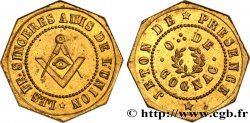fjt_755187 - FREEMASONRY MAISON PHILANTROPIQUE DE PARIS 1781
Not available.
Item sold on our e-shop (2022)
Price : 50.00 €
Item sold on our e-shop (2022)
Price : 50.00 €
Type : MAISON PHILANTROPIQUE DE PARIS
Date: 1781
Metal : silver
Diameter : 30 mm
Orientation dies : 6 h.
Weight : 8,2 g.
Edge : cannelée
Catalogue references :
Obverse
Obverse legend : DONEC A COELO DESCENDAT ; À L'EXERGUE : 1781.
Obverse description : Une main tenant un arrosoir sous le zodiaque; dans le paysage, un chateau fort, deux calvaires et un clocher au milieu des champs.
Obverse translation : Jusqu'à ce qu'elle descende du Ciel.
Reverse
Reverse legend : MAISON PHILANTROPIQUE DE PARIS.
Reverse description : en cinq lignes dans une couronne de feuillage.
Commentary
Sans être directement affiliée, cette société de bienfaisance partageait l’esprit de la maçonnerie et était le bras caritatif du Grand Orient de France. On trouve un document les concernant en ligne sur gallica avec le Plan d'établissemens à former sous la direction de la maison philantropique de Paris, pour élever les enfans trouvés, sans leur donner de nourrices... : discours lu au comité de la maison, le 1er décembre 1789 ([Reprod.]) / par M. le chevalier de Gestas.
La franc-maçonnerie s’implante en France aux alentours du premier quart du XVIIIe s. sous l’influence d’aristocrates anglais. Initiatique, elle est fondée sur le rite hiramique, du nom d’Hiram de Tyr, personnage biblique, architecte du roi Salomon sur le chantier du Temple et qui a résisté à la torture sans livrer ses secrets. Hiram a aussi donné un point de départ du calendrier maçonnique commençant 4000 ans avant le calendrier chrétien. Les symboles servent de signes de reconnaissance entre les initiés, notamment des outils de constructeur de cathédrales (équerre, compas, niveau, maillet, etc.), des formes (triangle, étoile), des nombres (trois, cinq, sept) et des lettres.
La franc-maçonnerie s’implante en France aux alentours du premier quart du XVIIIe s. sous l’influence d’aristocrates anglais. Initiatique, elle est fondée sur le rite hiramique, du nom d’Hiram de Tyr, personnage biblique, architecte du roi Salomon sur le chantier du Temple et qui a résisté à la torture sans livrer ses secrets. Hiram a aussi donné un point de départ du calendrier maçonnique commençant 4000 ans avant le calendrier chrétien. Les symboles servent de signes de reconnaissance entre les initiés, notamment des outils de constructeur de cathédrales (équerre, compas, niveau, maillet, etc.), des formes (triangle, étoile), des nombres (trois, cinq, sept) et des lettres.








 Report a mistake
Report a mistake Print the page
Print the page Share my selection
Share my selection Ask a question
Ask a question Consign / sell
Consign / sell
 Full data
Full data



